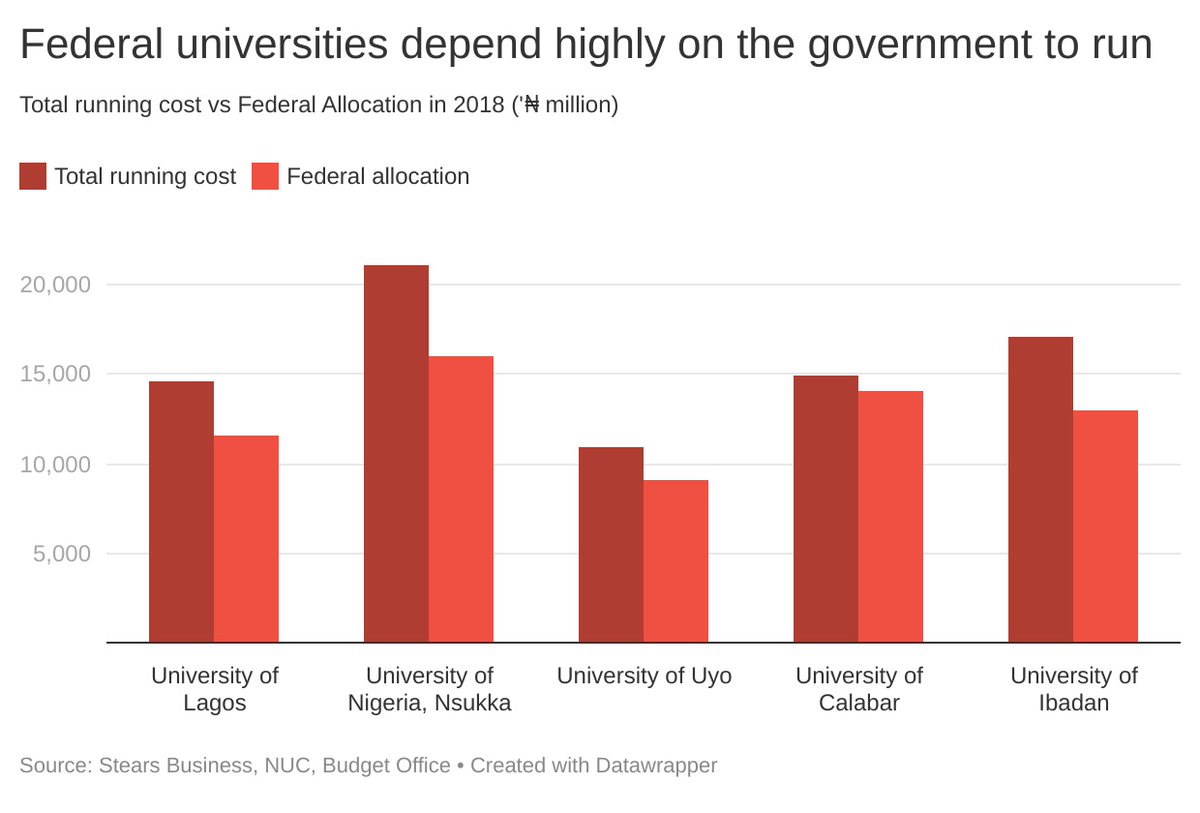Public universities in Nigeria are heavily subsidised by the Nigerian government. An undergraduate economics course costs just ₦55,000 annually in a typical public university, compared to ₦937,500 in some private universities. https://www.stearsng.com/premium/article/attracting-private-investment-in-nigerias-universities">https://www.stearsng.com/premium/a...
Here is the truth about subsidies: somebody, somewhere is footing the bill. There is no such thing as a free lunch.
In Nigeria, students at public unis pay the price in the form of frequent strikes, relatively low academic standards, and very little job market preparation.
In Nigeria, students at public unis pay the price in the form of frequent strikes, relatively low academic standards, and very little job market preparation.
Nigeria’s public university funding model is broken; the hard work is in finding a model that works.
Universities try to rely on school fees, but this can only work for private institutions as public fees are, again, heavily subsidised.
Universities try to rely on school fees, but this can only work for private institutions as public fees are, again, heavily subsidised.
Understandably, as many Nigerians are poor, the government is hesitant to charge higher fees that may prevent many people from attending.
But should expensive tertiary education be a merit good—i.e. a service provided based on what we need rather than what we can afford?
But should expensive tertiary education be a merit good—i.e. a service provided based on what we need rather than what we can afford?
Making it a merit good explains why universities look to the government to provide money for their major costs.
And like every business, universities have costs that vary across universities depending on how many students attend the school and what courses the school offers.
And like every business, universities have costs that vary across universities depending on how many students attend the school and what courses the school offers.
For example, while the University of Lagos (UNILAG), which boasts over 55,000 students, has running costs (capital and recurrent) of about ₦14.6 billion, Covenant University, with roughly 9,000 students, has an annual bill of ₦6.2 billion.
Staff salaries and allowances also make up a huge chunk of university expenses( ~50%). Almost all (₦11.6 billion) of the ₦11.8 billion allocated to the University of Lagos in the national budget is spent on employees.
The second highest cost is electricity
The second highest cost is electricity
There is very little left for innovation and capital expenditure.
It is a terrible idea for any Nigerian university to rely on the government for funding, particularly when universities around the world are becoming more self-sufficient.
It is a terrible idea for any Nigerian university to rely on the government for funding, particularly when universities around the world are becoming more self-sufficient.
Universities typically try to grow their incomes by increasing school fees, starting non-academic business ventures, or through support from other organisations.
Nigerian universities are focusing on the first two, but it is still insufficient to meet operational costs.
Nigerian universities are focusing on the first two, but it is still insufficient to meet operational costs.
UNILAG’s IGR is only about a third of its total annual costs. The avg cost of undergraduate education there is ₦619,400, yet a student’s avg fee is ₦53,500. UNILAG tries to make up for this shortfall through postgraduate fees, which cost about ₦250,000, but this barely helps.
In contrast, private universities, who do not receive any government funding, rely heavily on school fees, proprietary funds, and different types of endowments (You may be familiar with large buildings named after prominent individuals in universities).
Another source of financing is gaining traction in Nigeria, where universities receive funding from private investors. One of the most active investors in this space is Honoris United, which invests in universities across Africa with the financial backing of Actis, a PE firm.
Honoris recently acquired Nile University in Abuja and has exposed the school to a wealth of experienced faculty from its portfolio of 11 African universities.
The idea is that Honoris will manage the university’s operations to generate a return for investors in the long run.
The idea is that Honoris will manage the university’s operations to generate a return for investors in the long run.
Sometimes, private investment comes through partnerships: R&D services in exchange for funding or other resources OR sometimes the company focuses on supporting one aspect of the university’s progress or business...
Like the Rolls-Royce University Technology Centers (UTC) are research and technology development centres in more than 30 universities in countries like the US, UK, and Germany.
This type of collaboration will face significant hurdles in Nigeria. One of these is regulation.
This type of collaboration will face significant hurdles in Nigeria. One of these is regulation.
The Nigerian Universities Commission (NUC), regulates tertiary education in Nigeria and creates the Basic Minimum Academic Standard (BMAS), a compilation of the (RIGID) requirements for universities to carry out every course of study it intends to teach.
Teaching anything outside this curriculum would require the go-ahead of the NUC, which would only come after a series of letters and stakeholder engagements.
Once again, private universities have better positioned themselves for this by building research facilities.
Once again, private universities have better positioned themselves for this by building research facilities.
The government needs to shift focus from subsidising expensive tertiary education to financing cheaper early-stage education.
Quality tertiary education, one that creates ground-breaking innovation capable of making real change in sectors and generating growth, is expensive.
Quality tertiary education, one that creates ground-breaking innovation capable of making real change in sectors and generating growth, is expensive.
H/T @StearsBusiness @GbemiAlonge  https://abs.twimg.com/emoji/v2/... draggable="false" alt="🙌🏽" title="Raising hands (mittlerer Hautton)" aria-label="Emoji: Raising hands (mittlerer Hautton)">
https://abs.twimg.com/emoji/v2/... draggable="false" alt="🙌🏽" title="Raising hands (mittlerer Hautton)" aria-label="Emoji: Raising hands (mittlerer Hautton)">
Remember to subscribe! http://stearsng.com/subscriptions/ ">https://stearsng.com/subscript...
Remember to subscribe! http://stearsng.com/subscriptions/ ">https://stearsng.com/subscript...

 Read on Twitter
Read on Twitter


